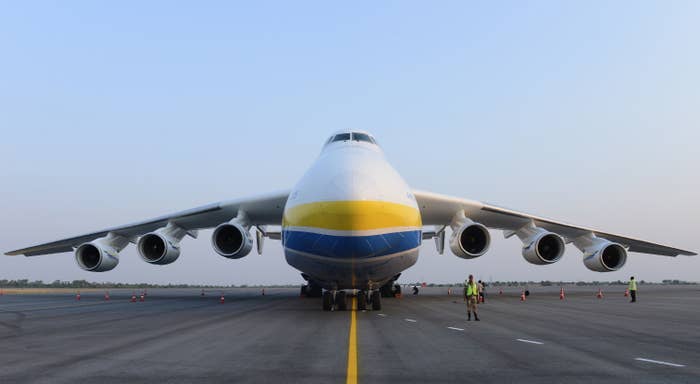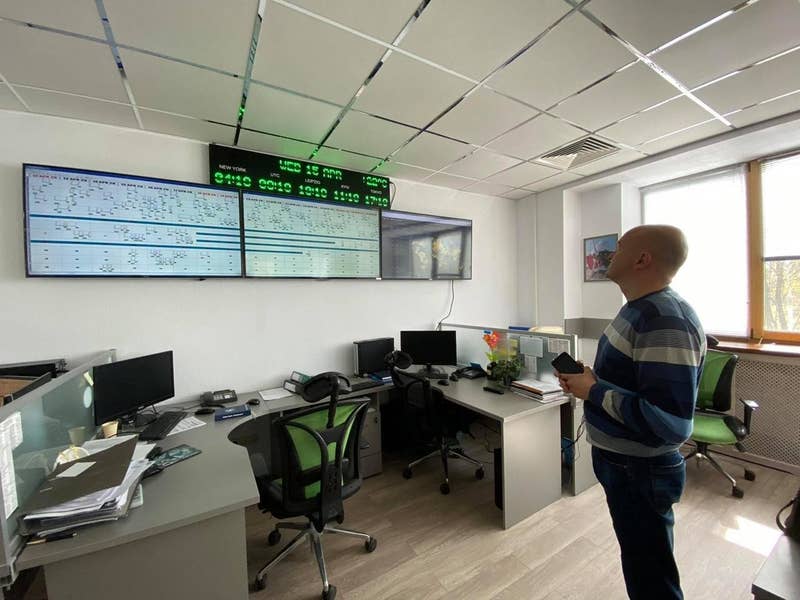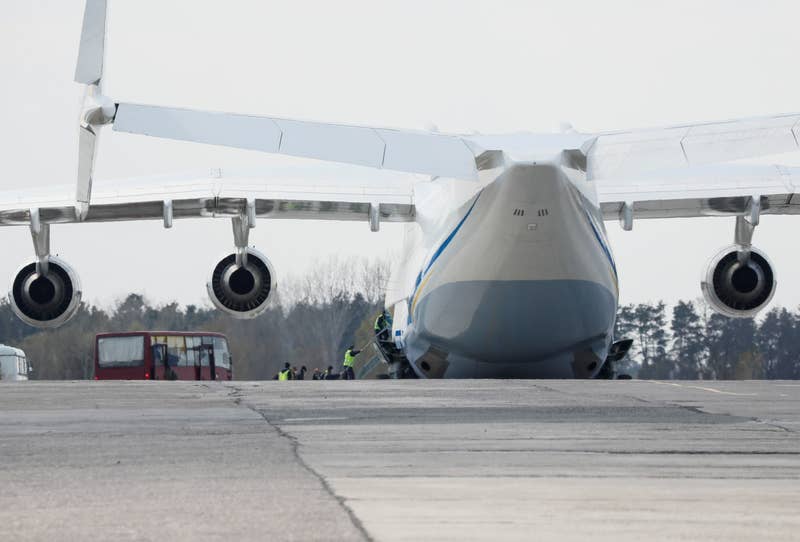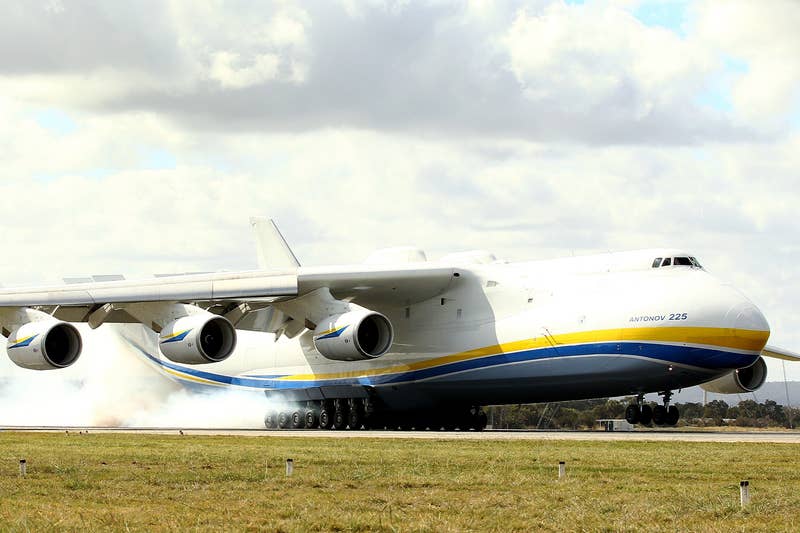LOTS OF BIG AIRPLANE PICTURESOver the course of the next month, planes owned by the state-run Antonov Airlines will carry medical masks and other supplies on 11 trips from Asian countries to the US.
Christopher MillerBuzzFeed News Contributor Posted on April 17, 2020

Noah Seelam / Getty ImagesThe Antonov AN-225 Mriya, at Rajiv Gandhi International Airport in Hyderabad, India, in 2016.
In May 2019, President Donald Trump described Ukraine as being full of “terrible people” who “tried to take me down.” Two months later, he was on the phone with his newly elected counterpart, Volodymyr Zelensky, asking him to “do us a favor.”
The favor Trump wanted — opening investigations into his political rival, Joe Biden, now the presumptive Democratic nominee for president — never came, and Trump withheld important military aid to the war-torn country for months. The rest, as they say, is history.
But months later, as the coronavirus pandemic ravages the US, Ukraine is doing Trump a huge favor: The country is using its cargo planes — the biggest in the world — to ferry crucial personal protective equipment (PPE) from Asia to medical professionals on the front line of the health crisis in the US.
Over the course of the next month, Ukrainian state-run Antonov Airlines will send its giant An-225 Mriya and An-124 Ruslan planes on at least 11 trips from Asian countries to the continental US, Vitaliy Shost, Antonov’s deputy director, told BuzzFeed News from the company’s headquarters in Kyiv.
“Our first flight to the US is planned for next week — with a flight from Shanghai to Columbus, Ohio,” Shost said. The cargo consists mostly of medical masks, protective clothing, and disinfectant agents, he said.
Aivaras Abromavicius, CEO of Ukroboronprom, the Ukrainian state defense conglomerate that oversees Antonov, told BuzzFeed News from Kyiv that some flights could include ventilators.

Antonov Airlines/Tetiana Peklun
Vitaliy Shost looks at a calendar showing the dozens of booked Antonov Airlines flights in the coming weeks that will deliver medical aid.
The deliveries come as the coronavirus crisis in the US drags on and hospitals across the country continue to report shortages of basic medical supplies.
Shost declined to disclose commercially sensitive information such as how the flights to the US were paid for and how much they cost. He said the company operates “through brokers” and has “no direct contact or very limited connection with the cargo owners.” Use of the Mriya reportedly costs around $30,000 an hour and may run as high as $1 million in total, depending on the type of cargo carried and the distance needed to travel.
If you're someone who is seeing the impact of the coronavirus firsthand, we’d like to hear from you. Reach out to us via one of our tip line channels.
At 275 feet in length and weighing 310 tons completely empty, the Mriya — Ukrainian for “dream” — is the world’s largest and heaviest cargo aircraft. With six powerful engines on its 290-foot wings, it’s capable of carrying another 275 tons — strapped to its top, as it did with the Soviet Union’s Buran space shuttle, or in its cargo hold. To get a sense of just how big that space is, consider this BBC description: The length of its cargo hold is longer than the Wright brothers’ first flight, from takeoff to landing. It’s also the only Mriya ever produced; a second one remains unfinished in a hangar in Kyiv.
The slightly smaller Ruslan is anything but small; at 226 feet and weighing 200 tons, it is the largest military cargo plane in the world. And Antonov owns five of them, including one model that can carry 120 tons of cargo and a second that is reinforced and able to lift 165 tons.
Often the planes are used to transport oversize cargo, such as military tanks, plane engines, and even smaller aircraft fuselages. They are loaded on board through an opening in the nose of the planes.
Because of the enormity of the planes and the current health risks, Abromavicius said “the utmost care is needed in planning these flights, loading the cargo, following the flight instructions and quarantine instructions.” He said everything has to run with the “precision of a Swiss watch.”

Gleb Garanich / Reuters
People wearing protective masks board a renovated Antonov An-225 Mriya cargo plane on the tarmac of an airfield outside Kyiv earlier this month.
All models of the Antonov planes will be used in the US deliveries between mid-April and mid-May, Shost said. He said there is the possibility that more flights to the US could be made later as well.
The planes are in high demand elsewhere. Since March, Shost said, several countries have chartered either the Mriya or the Ruslans to shuttle supplies to their coronavirus-stricken nations. They include Canada, Austria, the Czech Republic, Denmark, France, Germany, Greece, Ireland, Kuwait, Poland, Portugal, Qatar, Slovakia, Spain, and Switzerland.
A video published on Tuesday shows the Mriya landing in Warsaw, where it delivered tons of medical supplies purchased from China by the Polish government. The livestream shared by Chopin Airport was watched by more than 80,000 people.
The departures and arrivals of the Mriya, which Shost boasted as being “part of our Ukrainian heritage,” are seen by aviation enthusiasts as big events. Heads of government and even royalty turn out to see the behemoth in action, Shost said.
The Mriya’s next medical supply delivery is in Paris on Saturday.
The global demand for the planes has translated to a 40% jump in orders for Antonov Airlines. That means all of its planes are booked through much of May.
“Thіs April, according to our estimates, is a record month in terms of the flight time,” Shost said. For instance, the Ruslan planes alone clocked 1,001 hours halfway through the month. “This is fantastic, but it’s not done magically,” Shost said. “Our relatively small team works really hard to arrange all the flights and requests.”

Paul Kane / Getty Images
The Antonov AN-225 Mriya landing at Perth international airport in Australia in 2015.
The US is also doing its part to help Ukraine in its fight against the coronavirus. Like the US, Ukraine has seen the number of infections within its borders increase exponentially since March. As of April 17, Ukraine had 4,662 recorded cases, with 125 related deaths. And medical supplies there are in short supply.
The State Department said in a statement Thursday that it is providing Ukraine with $9.1 million in health and humanitarian assistance to “help prepare laboratory systems, activate case-finding and event-based surveillance, support technical experts for response and preparedness, bolster risk communication, and more.”
It said the assistance will also prevent and control infection at targeted health facilities and support water, sanitation and hygiene interventions for the most vulnerable populations in the regions of Donetsk and Luhansk, eastern Ukraine. Six years of war between the Ukrainian military and Russia-controlled separatist forces has killed some 14,000 people and devastated the regions’ economies and infrastructure.
The US has invested nearly $5 billion in total assistance to Ukraine over the past 20 years, including nearly $362 million in health assistance, according to the State Department.
Also included in that total was $391.5 million in security assistance that Trump personally ordered to be held up in order to get Ukraine’s President Zelensky to bend to his will. He ultimately released the aid in September, but only after a whistleblower complaint that sparked the Democrats’ impeachment inquiry.
---30---
No comments:
Post a Comment